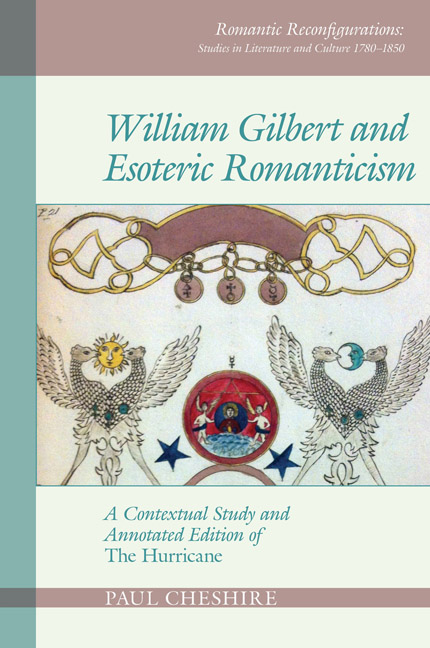 William Gilbert and Esoteric Romanticism
William Gilbert and Esoteric Romanticism from Part One - William Gilbert in Romantic Culture
Bless us! I was most intimate with poor Gilbert, who was as mad as a March hare, & who has written letters to me referring to & prolixly repeating conversations of mine which not only never had, but never could have, taken place!
S. T. Coleridge, MarginaliaThe Watchman
The most immediate signs of Coleridge's intimacy with ‘poor Gilbert’ are two pieces of Gilbert's writing that appeared in The Watchman, the periodical ‘miscellany’ that Coleridge published every eighth day (thus avoiding a tax on weekly newspapers) between March and May 1796. The Watchman was intended as part of the concerted opposition to the Two Bills that threatened to ban political protest as ‘Treasonable Practices’ or ‘Seditious Meetings’; but these ‘gagging’ Bills became law before The Watchman appeared in print. Hence Coleridge's first essay shied away from direct opposition and talked of ‘the diffusion of that general knowledge which should be the basis or substratum of politics’ (p. 14), an approach that shows remarkable consistency with his later writings.
Gilbert's essay ‘The Commercial Academic: No. I’ by ‘Mr. G—rt’ appeared in The Watchman, V: 2 April 1796. It was first attributed to Gilbert by Lewis Patton (Watchman, pp. 168–72). The strutting barrister rhetoric has enough in common with Gilbert's prose style to give credibility to Patton's attribution. Its topic, macroeconomics, may seem a surprising departure from the macrocosmal astrology Gilbert had been propounding in London, but it certainly proves Cottle's point about Gilbert delighting in argument. Coleridge's praise is qualified (Gilbert's ‘reasonings are perhaps not unimpregnably solid’) but he has a periodical to fill, is hungry for contributions, and a regular series has been promised: ‘The Editor returns his grateful acknowledgements to Mr. G—rt for the following Essay, and will anxiously expect the remaining Numbers’ (p. 168). No further numbers appeared.
Although this is nowhere stated, the contents of Gilbert's essay suggest strongly that he was prompted to write it in response to Coleridge's ‘On the Slave Trade’, which had appeared in the previous issue of The Watchman. Coleridge's essay (based on his ‘Lecture on the Slave-Trade’ given at the Assembly Coffee House on 16 June 1795) argued that human vices (and hence the slave trade) arise from ‘imaginary Wants. […]
To save this book to your Kindle, first ensure [email protected] is added to your Approved Personal Document E-mail List under your Personal Document Settings on the Manage Your Content and Devices page of your Amazon account. Then enter the ‘name’ part of your Kindle email address below. Find out more about saving to your Kindle.
Note you can select to save to either the @free.kindle.com or @kindle.com variations. ‘@free.kindle.com’ emails are free but can only be saved to your device when it is connected to wi-fi. ‘@kindle.com’ emails can be delivered even when you are not connected to wi-fi, but note that service fees apply.
Find out more about the Kindle Personal Document Service.
To save content items to your account, please confirm that you agree to abide by our usage policies. If this is the first time you use this feature, you will be asked to authorise Cambridge Core to connect with your account. Find out more about saving content to Dropbox.
To save content items to your account, please confirm that you agree to abide by our usage policies. If this is the first time you use this feature, you will be asked to authorise Cambridge Core to connect with your account. Find out more about saving content to Google Drive.